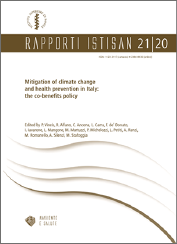Rapporto ISTISAN 21/20 - Mitigation of climate change and health prevention in Italy: the co-benefits policy. Edited by Paolo Vineis, Rossella Alfano, Carla Ancona, Luca Carra, Francesca de’ Donato, Ivano Iavarone, Lorenzo Mangone, Marco Martuzzi, Paola Michelozzi, Luca Petiti, Andrea Ranzi, Marina Romanello, Andrea Silenzi, Massimo Stafoggia - ISS (EN)
Rapporto ISTISAN 21/20 - Mitigation of climate change and health prevention in Italy: the co-benefits policy. Edited by Paolo Vineis, Rossella Alfano, Carla Ancona, Luca Carra, Francesca de’ Donato, Ivano Iavarone, Lorenzo Mangone, Marco Martuzzi, Paola Michelozzi, Luca Petiti, Andrea Ranzi, Marina Romanello, Andrea Silenzi, Massimo Stafoggia

Istituto Superiore di Sanità
Mitigation of climate change and health prevention in Italy: the co-benefits policy.
Edited by Paolo Vineis, Rossella Alfano, Carla Ancona, Luca Carra, Francesca de’ Donato, Ivano Iavarone, Lorenzo Mangone, Marco Martuzzi, Paola Michelozzi, Luca Petiti, Andrea Ranzi, Marina Romanello, Andrea Silenzi, Massimo Stafoggia
2021, iii, 64 p. Rapporti ISTISAN 21/20
An undisputable body of evidence shows that man-made climate change, mainly driven by fossil fuel combustion, is underway and accelerating. Changes are being recorded at the global level, and Italy is no exception. Projections show that, unless drastic reduction of emissions is achieved, average global temperatures will increase by more than 2 degrees compared to pre-industrial levels. Italy is particularly vulnerable to these changes. To prevent such a catastrophic scenario urgent action is necessary. Considering the human health implications of different policy scenarios can help identify and implement policies for climate change mitigation and adaptation, at global and local level. Policies and interventions in some areas can achieve multiple health benefits while reducing emissions. In particular, action on urban design and transport, green spaces and air quality, food production and consumption, including dietary habits, can mitigate climate change and result in substantial health co-benefits.
Key words: Climate change; Co-benefits; Global health; Heat; Pollution; Diet
Published 16/11/2021



